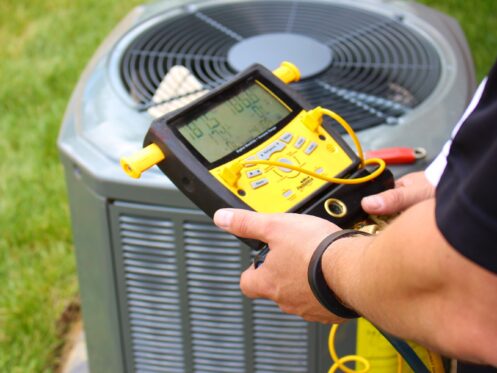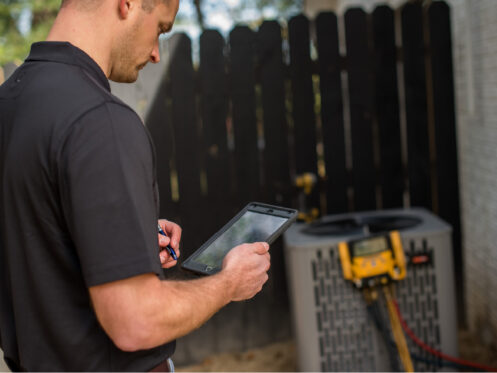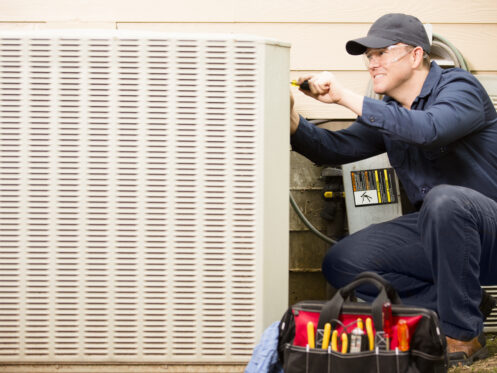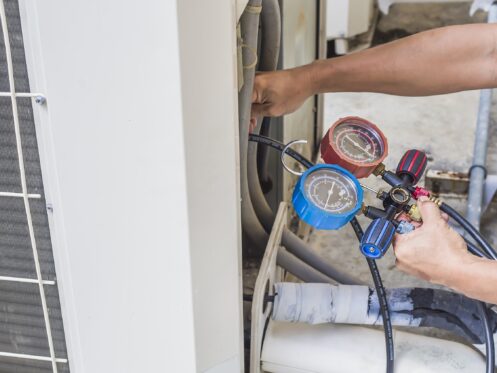No one wants to suddenly discover that their home’s AC system has failed. That is especially the case if you’re in the middle of a summer heat wave. However, the time to avoid such a sweaty fate isn’t in the summer. The time to check for possible AC repair needs is when the weather is still on your side. Here’s how you can tell if your home’s AC needs repairs before the summer heat peaks.
Bad Noises
Air conditioners have a decent number of moving parts, which can be prone to failure, particularly if your AC is aging. Banging, squealing and clanking noises tend to indicate that the system has loose parts. The problem could be as simple as a worn bearing in a blower motor or as worrisome as a failing compressor. In some cases, banging comes from ductwork issues, too.
Grinding and other metallic sounds are almost always associated with fans, blowers and associated motors. A lack of lubrication may have caused parts in the AC to reach the point of metal-on-metal contact.
Clicking sounds are less common, but they indicate potential electrical problems. For example, a failed electrical relay from the thermostat to one of the AC’s control systems might cause your system to repeatedly retry signaling. This repeated action sometimes gives off a clicking sound.
Hissing is a notably bad problem. The most likely cause is a refrigerant leak. If your AC is losing refrigerant, it’s also going to struggle to provide sufficient cooling. This can cost you a lot of money if you keep operating the AC in this condition.
Particularly because of the possibility that the issue could involve the compressor or refrigerant, you should take all noises seriously. Getting in front of noise problems may save you about 60% on more minor AC repairs compared to what you can expect if key components fail catastrophically.
Poor Airflow
Weak airflow tends to arise from a handful of issues. On the upside, one of the simplest things that homeowners can check is whether the air filters are clogged. A clogged air filter can significantly constrain airflow, but replacing one is a comparatively cheap fix.
Ductwork issues can also cause airflow problems. If a duct is damaged, it could be leaking most of your AC’s cooled air into a wall or your home’s basement. Sometimes, failing fan motors in the ducts can cause problems. Likewise, a potential simple fix is to verify that the vents and returns are open enough to permit airflow. It is also a good idea to check that something large, like a piece of furniture or even a heavy curtain, isn’t blocking the system’s airflow.
Issues with dampers in the ductwork can also inhibit airflow. Dampers are components that slow airflow, usually in locations that are closest to the main blower motor in your home’s AC unit. The goal is to discourage airflow in those zones to balance out your home’s air pressure. This provides extra air pressure to other parts of your house. However, dampers can corrode or wear out, potentially sticking in closed or open positions that throw off your home’s airflow.
Bad Smells
Air conditioners rely heavily on evaporator and condenser coils to move heat around. This process also helps to dehumidify your home. When it fails, though, the net effect is an increase in indoor humidity. Oftentimes, the first sign that your home is getting more humid is an increase in mold growth. This leads to a musty smell, which many people think of as the signature smell of a basement.
Coils can fail for a host of reasons. The problem could be as simple as the coils getting dirty. If the problem is dirty coils, our technicians can safely clean the coils, which is a typical AC maintenance service task. However, coils can also corrode with age, potentially leading to refrigerant leaks. Associated fittings can corrode as well, leading to similar results.
Burning smells are more worrisome. If your AC is producing a burning smell, turn it off immediately. A burning smell indicates that a motor or an electrical system has likely completely failed. If the problem is electrical, it could pose a fire risk. The smell you’re probably picking up comes from volatile organic compounds inside the AC unit, usually rubber or plastic that’s melting.
Growing Energy Costs
An AC headed for repair work doesn’t always put on a big show as it fails. An aging air conditioner without annual maintenance can suffer about a 5% yearly decrease in efficiency. Parts just slowly rub together more. Likewise, settings can drift out of spec. Also, your household’s usage patterns may change. These all lead to worsening performance that often shows up first on your summer electric bill.
If you can’t tie your electrical bill’s uptick to a reasonable explanation, like a heat wave or a utility rate hike, then there’s a good chance the AC is the culprit. Fortunately, minor maintenance and repairs can frequently get an air conditioner back on track. In many cases, checking your electric bill serves as an early warning that something big might be failing. This lets you get in front of potentially expensive repairs.
Short Cycling
A short cycle involves the air conditioner coming on briefly and then turning off. Frequently, short cycling also leads to the AC doing this more often.
Notably, a variety of problems may trigger short cycling. The issue could be as simple as a thermostat malfunction. However, a failed compressor or capacitor could also cause a short cycle. Faulty electrical systems may send bad data to the AC’s control unit. Likewise, failing sensors could be feeding inaccurate data. The circuit board in the control unit might be failing, too.
There are also plenty of minor problems that can cause short cycling. A clogged air filter can lead the system to overheat and trigger an automated shutoff. The same goes for dirt collecting on the coils. Tracing short cycling to a specific cause can be a very involved diagnostic process, so it’s best to schedule an appointment with one of our knowledgeable technicians.
Short cycling might not seem like a big deal if you’re still getting the temperatures you desire. However, short cycling can shorten the life of your AC considerably. The process of winding up for an air conditioning cycle strains the system the most. This leads to wear and tear on moving parts if it happens too often.
Ice Buildup
It can seem a little weird to see ice collecting on the exterior components of an AC, especially if the weather is hot. However, even a small constriction of airflow around the coils can cause them to struggle to warm back up. The problem may just be dirty coils. However, a faulty expansion valve can also encourage ice buildup. Low refrigerant levels can prevent the restoration of the heat balance, leading to ice.
Cozy Home Services handles heating and air conditioning services for residents of Vacaville, CA, and the surrounding areas, so contact us today if you notice any issues with your system.





